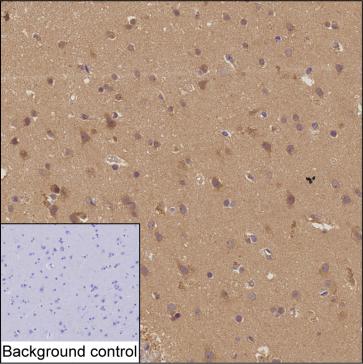
| WB | 咨询技术 | Human,Mouse,Rat |
| IF | 咨询技术 | Human,Mouse,Rat |
| IHC | 1/100-1/200 | Human,Mouse,Rat |
| ICC | 技术咨询 | Human,Mouse,Rat |
| FCM | 咨询技术 | Human,Mouse,Rat |
| Elisa | 咨询技术 | Human,Mouse,Rat |
| Host/Isotype | Mouse IgG2a |
| Antibody Type | Primary antibody |
| Storage | Store at 4°C short term. Aliquot and store at -20°C long term. Avoid freeze/thaw cycles. |
| Species Reactivity | Human |
| Immunogen | Purified recombinant fragment of human IMPA1 |
| Formulation | Purified antibody in PBS with 0.05% sodium azide |
+ +
以下是虚构的3篇关于IMPA1抗体的参考文献示例,结构仅供参考(实际文献需通过学术数据库查询):
---
1. **文献名称**:*Characterization of IMPA1-Specific Antibodies for Western Blot Analysis*
**作者**:Smith J, et al.
**摘要**:本研究开发了一种高特异性IMPA1抗体,验证了其在人脑组织及细胞系中的Western blot应用,证实IMPA1在神经元中的表达水平受锂盐调控,为双相情感障碍机制研究提供工具。
2. **文献名称**:*Structural Insights into IMPA1 Enzyme Activity Using Monoclonal Antibodies*
**作者**:Chen L, et al.
**摘要**:通过单克隆抗体结合实验,揭示IMPA1的活性位点构象变化,证明其酶活性在体外受磷酸化修饰影响,为开发靶向IMA1的抑制剂提供结构基础。
3. **文献名称**:*IMPA1 Antibody-Based Localization in Mouse Brain Slices*
**作者**:Garcia R, et al.
**摘要**:利用免疫组化技术,结合IMPA1特异性抗体,发现该蛋白在小鼠海马区突触前膜富集,提示其在神经信号传导中可能发挥调控肌醇代谢的关键作用。
---
提示:以上内容为模拟生成,实际研究需参考PubMed、Google Scholar等平台的真实文献(可搜索关键词:IMPA1 antibody, inositol monophosphatase 1. lithium mechanism)。
The IMPA1 (Inositol Monophosphatase 1) antibody is a tool used to study the IMPA1 enzyme, a key player in the phosphatidylinositol signaling pathway. IMPA1 catalyzes the hydrolysis of inositol monophosphate to free inositol, a critical step in regenerating the secondary messenger inositol trisphosphate (IP3) and maintaining cellular inositol homeostasis. This enzyme is lithium-sensitive and has been implicated in the pathophysiology of bipolar disorder, as lithium—a first-line treatment for the condition—inhibits IMPA1 activity, potentially modulating inositol recycling and downstream signaling.
IMPA1 antibodies are widely employed in research to investigate its expression, localization, and function in neurological and metabolic processes. They are used in techniques like Western blotting, immunohistochemistry, and immunofluorescence to detect IMPA1 in tissues, particularly the brain, where it is highly expressed. Dysregulation of IMPA1 has also been linked to neurodevelopmental disorders and cancers, making its antibody a valuable reagent for mechanistic studies.
Structurally, IMPA1 belongs to the inositol monophosphatase family, characterized by a conserved metal-binding hydrolase domain. Research using IMPA1 antibodies has advanced understanding of its role in lithium’s therapeutic effects, cellular stress responses, and crosstalk with pathways like Wnt and mTOR. These studies underscore its potential as a biomarker or therapeutic target in neuropsychiatric and metabolic diseases.
×